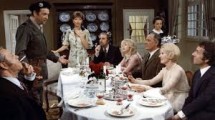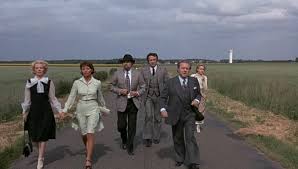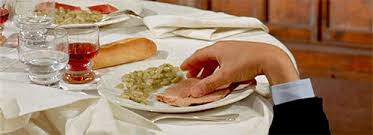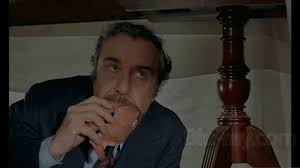The Discreet Charm of the Bourgeoisie

(Directed by Luis Buñuel) (1972)
As a card-carrying petit bourgeois, wishing in vain to join the haute bourgeoisie, I write in fearful admiration of this film and of the sublime, formless way in which it communicates its comedy of terrors. For whom amongst our class does not relish that arcane and secret ceremony known as the luncheon or dinner party? What a delight – to dress, eat, drink, prattle before friends and show-off…so many comforting displays of mouths and hands…there is no more delightfully bourgeois ritual than that!
Now to apply the black smudges to our painted drawing-room comedy: the six fashionable friends and dining companions never get to savour their meals. They forage here, they forage there; just when all is ready, the cutlery polished, the crockery gleaming…the glassware scintillates, the napery eased over reassuringly heavy furniture – all of a sudden, the surreal intrudes, a perverse paralysis descends and the soirée dissipates, diminishes, vanishes! in a myriad ways.
Buñuel offends The Varnished Culture‘s filament-like sensitivity, by imposing increasingly grotesque and arbitrary encroachments on the humble attempts at civilised nutrition on the part of the Ambassador of Miranda (Fernando Rey), his Parisian friends, M Sénéchal (Jean-Pierre Cassel), Mme Sénéchal (Stéphane Audran), the Thevenots (Paul Frankeur and Delphine Seyrig) and Mrs. Thevenot’s lush of a sister, Florence (Bulle Ogier ).
Quelle horreur! All symmetrical charm is torn asunder: Either the hosts have diarised the affair wrongly, or the nearby restaurant has the owner lying in state, in the prominently placed open casket, or all settle to table when up goes a curtain and the diners find themselves appraised by a theatre crowd (“I don’t know my lines” blurts M Sénéchal, sotto voce, breaking out in a flop sweat). Or else the gendarmes haul them off to gaol. Episodes seem to be dreamed by dinner patrons whose dreams are then dreamed by their fellows: it’s like an emulsion of Groundhog Day and the 9th season of Dallas. The Sénéchal’s young maid claims to be aged 52. Passing planes drown out key dialogue. Absurdity piles upon absurdity to hilarious effect.
The skull beneath the skin, the beast beneath the barnacles, are gloriously, crazily revealed here. Animal drives and desires break from cover once the genteel veneer is stripped away. The Ambassador is insouciantly dealing in cocaine and staving off terrorist attacks. The chauffeur is called in to skol a martini and the group complacently reflect that you cannot inculcate refinement in the masses. A priest/gardener/killer is welcomed once he dons his outwardly refined garb – the hosts slip out the back and copulate in the bushes, whilst our intrepid bunch fidget vainly at the dining table. The ‘cavalry’, on manoeuvres, puff away on their joints, and at a cocktail reception, they all mount a joint verbal attack on Miranda’s parlous democracy (it seems loosely based on Bolivia or Paraguay), ganging-up mercilessly on the Ambassador. “I didn’t know that chivalry still existed in your semi-savage country.”
The ultimate hypocrisy appears, ultimately; gangsters, or terrorists, open fire on assembled dinner guests. Buñuel’s violence is not violent so much as abrupt. This capriciousness is what evokes emotion in the viewer. So assured are the director’s cynical approach and the wonderful matter-of-fact performances by the leads, that after toying with a repeat viewing over soupe à l’oseille à la crème, oie farcie aux marrons and a bottle of claret, The Varnished Culture decided that this film is a hugely enjoyable counter-comedy of the highest order. Our bourgeois sensibilities aside.
Leave a comment...
While your email address is required to post a comment, it will NOT be published.





0 Comments